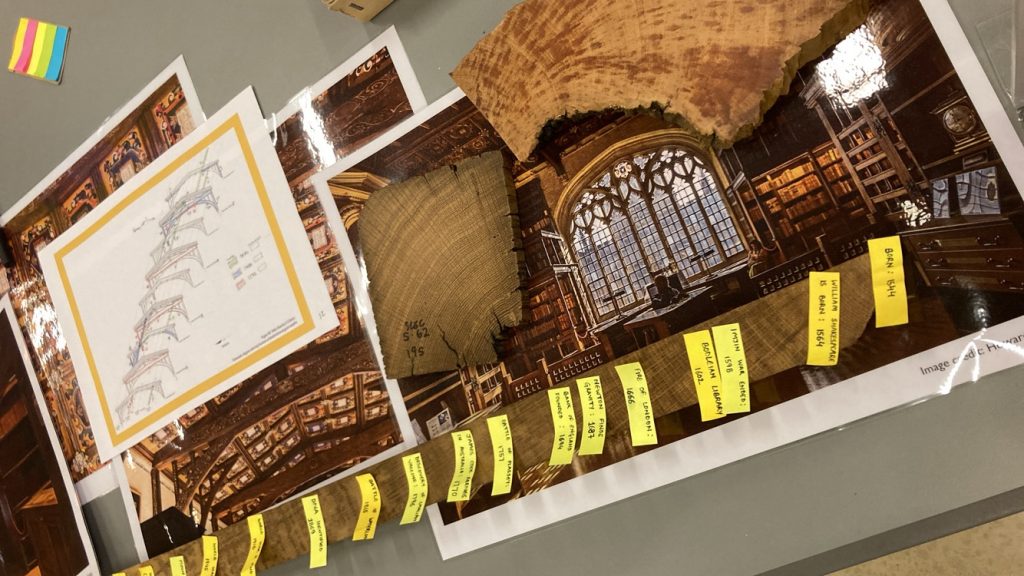The College’s Randall-MacIver studentship was established in 1964 after the death of the widow of former student, Egyptologist and archaeologist David Randall-MacIver. We spoke to our current Randall-MacIver student Jennice Singh about her research into the archaeology of trees.
Can you tell us a bit about your research area, which examines trees in New Zealand using a method of dating using oxygen isotopes?
My research focuses on applying oxygen isotope dendrochronology to native New Zealand trees. These species are culturally and archaeologically significant, particularly Matai and Miro, which Māori communities used extensively for crafting canoes and constructing fortified settlements, known as Pā. Unfortunately, traditional methods like radiocarbon dating and ring-width dendrochronology often fail with these trees due to growth anomalies and calibration challenges in the Southern Hemisphere. By developing an oxygen isotope time series, my work aims to establish a robust framework for dating archaeological timbers, bridging a critical gap in understanding Māori and European heritage as preserved in timber archives. I am deeply grateful for the Randall-MacIver Scholarship and Queen’s College that supports this pioneering research, allowing me to contribute to both archaeological science and cultural understanding.
Why is this your method of choice?
Oxygen isotope dendrochronology has been highly effective in the UK, especially with oak and elm, where it has provided precise dates even when ring-width dendrochronology struggled. By focusing on δ¹⁸O variations influenced by summer precipitation, this method overcomes issues like growth irregularities and short samples. Its success with oak inspires confidence that it can address similar challenges with trees in New Zealand, offering a reliable framework for dating culturally significant timbers.
What questions about past climates are you hoping to answer with your work?
While the primary goal of my research is to refine timelines for archaeological applications, the isotopic data encoded in tree rings can indirectly offer insights into rainfall and temperature variability over the last 800 years, a period that covers the timeline of human settlement in New Zealand. These patterns can enhance our understanding of how environmental conditions influenced Māori interactions with their environment and broader historical events.
What inspired you to explore this area?
Growing up amidst the mountains of Nainital, India, surrounded by towering pine and ancient chestnut trees, I developed a deep fascination with trees and their histories. These early experiences, combined with listening to folklore, naturally evolved into a passion for studying tree rings. During my undergraduate studies in archaeology, I became interested in understanding how past societies interacted with climatic changes. However, it was during my MSc in Archaeological Science at Oxford that I became specifically drawn to isotope dendrochronology as a method for exploring both chronological and environmental dimensions of the past.
I became interested in understanding how past societies interacted with climatic changes
What are the key challenges that you face in your research?
Some challenges include difficulties in using ring-width dendrochronology on fast-growing species like Matai and Miro, which often exhibit growth anomalies and resin pooling. Additionally, obtaining samples from historic buildings and artefacts is challenging due to preservation issues. In New Zealand, the protected status of these species necessitates working collaboratively with locals to ensure cultural sensitivity and legal compliance during sampling.
What do you enjoy about being based at Queen’s?
Queen’s offers a wonderfully supportive academic environment and a vibrant community. The book grant, available to all Queen’s students, is a commendable initiative that has been particularly beneficial. Every interaction, from the friendly smiles at the Lodge to the chef’s creative desserts, adds a special charm to college life.
Can you recommend a book?
In terms of fiction, I feel there’s an underappreciated richness in Asian literature, where emotions are explored with a rawness that’s truly captivating. The Face of Another by Kōbō Abe, is a Japanese classic that delves into the topics of identity, human nature, and the psychology of isolation. Another favourite is Please Look After Mom by Korean author Kyung-sook Shin. This novel is an emotional excavation, tenderly and subtly peeling back layers of unexpressed love and regrets that lie beneath the surface of family life, revealing the haunting echoes of missed opportunities.




